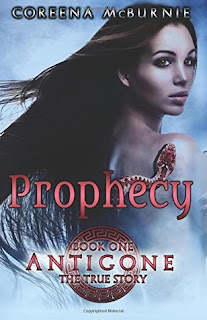Prophecy
Prophecy
by Coreena McBurnie
4 out of 5Synopsis
A hidden prophecy. A chosen princess who speaks with snakes. A family duty. Sixteen year old Princess Antigone, daughter of the infamous ancient Greek King Oedipus, wants to lead a normal life and fulfill her duty to the gods, her city, and her family, but fate has other plans. The Olympian gods bless her, the snakes talk to her, her parents want her to marry a foreign prince, her embroidery looks like burial shrouds for dogs, and she has fallen in love with the wrong boy. When the mysterious and devastating prophecies surrounding her family are revealed, Antigone must choose where her allegiance lies: With the gods who have betrayed her family but who she is obliged to serve? With her plague ridden city? With her family which lay in ruins? Or even with herself?
In Prophecy, Book One of the Antigone: The True Story series, Antigone steps out of the shadows of the past to tell her own story, a story where truth of history is stranger than the fiction of myth.
Review
Princess Antigone of Thebes is an expert at avoiding the duties and expectations of a Theban princess. She knows what to expect from this life. Until the god Apollo recognises her, and a new path is suddenly open.
I received a free copy in exchange for an honest review.
I snapped up the offer of course - Greek mythology, vengeful gods and talking snakes? Yes please!
Antigone is the daughter of King Oedipus (yes, that Oedipus), and her family are very content and blissful in their ignorance. Oedipus and his wife, Queen Jocasta are happily married with four children.
Antigone gets riled at the constraints of being a princess, she finds the skills that she must learn boring and beyond her ability. She knows that one day she will have to marry and have a whole new set of rules and restraints. She hopes that the fact that her sister Ismene is the perfect example of a princess will take some of the pressure away from herself.
Everyone praises Antigone for being such a devotee to the gods; that she spends so much time in the temples and always offers tributes etc. But she isn't. Sort of. To begin with, Antigone uses her visits to the temples as an excuse to get out of whatever boring lesson or chore she has been assigned. Her faith is there, but it is not overpowering. Her interest only truly lights up when Apollo chooses her; and Antigone realises that this is a path she could really take, that her fate isn't already set.
I did really like Antigone, she's fun and easy-going, she has realistic ambitions and dreams. She is somewhat naive, but you feel sorry for her, that she was forced to live a certain way because of her position.
I wasn't really keen on how everyone else treated her.
It felt like McBurnie was checking off the YA stereotypes: that Antigone is special (but she doesn't know it); that Antigone is beautiful (but she thinks she's a scruff next to her sister). I could have done without everybody expressing these things because a) it came off a little cheesy; and b) Antigone is a strong and interesting character without everyone fanning her modest ego.
The historical accuracy and background were all well-researched, it was an enjoyable adventure through ancient Thebes; it was (mostly) respectful of the era and stories that had gone before it, without feeling like a dry history lesson.
The (mostly) is because it didn't always hit the mark. These are the Kings and Queens of ancient Greece, and of immortal gods and goddesses who think nothing of playing with the fate of mortals. It often sounded like modern America, with phrases more suited to a high-school drama:
"Antigone is bang on there." Oedipus, King of Thebes.
Yeah, that was one of my favourites.
I always prefer when characters talk how I would expect them to talk.
After the lovely, slow build of the story, I felt the last part was very rushed. After Oedipus finds out that... wait, is that a spoiler? Ok, for those of you who don't know his story, it gets the benefit of spoiler tags - ((spoiler)) after Oedipus finds out that the woman he has been happily married to for twenty years is actually his mother ((spoiler)) - it jumped through the rest of the story incredibly fast, to bring about the finale.
It almost felt like, because this section was the closest to the original myth, the part that had been told countless times before; McBurnie opted for almost a highlights version.
Overall, I really enjoyed the book. It is a nice easy, historical read and I would recommend checking it out.
Goodreads link
Amazon.co.uk

Comments
Post a Comment